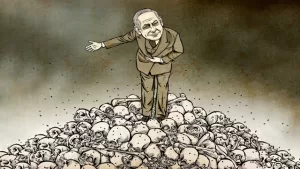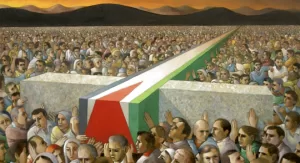❈ ❈ ❈
Gaza Genocide Death Toll Tops 20,000 Amid Mass Starvation
Andre Damon
The death toll of Israel’s genocide in Gaza reached 20,057, according to a statement Friday by Gaza’s Ministry of Health. Taking into account the 7,000 missing, most buried under rubble, the true death toll has likely already exceeded 25,000.
A death toll of 20,000–25,000 out of a population of just over 2 million means that more than one out of 100 people in Gaza has been killed in the past two-and-a-half months. This is the equivalent of 3.3 million people in the United States.
The Health Ministry said over 50,000 people are wounded, of whom 5,000 are in critical condition and risk death unless they are transferred abroad for treatment.
Ashraf Al-Qudra, a spokesman for the Health Ministry, said that 50,000 pregnant women and about 900,000 children are suffering from malnutrition. He said that just one-fiftieth of the required aid is traveling into Gaza.
On Thursday, the United Nations reported that a quarter of Gaza’s population, or over 500,000 people, is starving. “Hunger is ravaging Gaza, and this is expected to increase illness across the Strip, most acutely among children, pregnant and breastfeeding women, and older people,” the UN wrote in its report.
The UN reported that 93 percent of the population is facing “crisis levels of hunger,” while one in four households is facing “catastrophic conditions” of starvation. It concluded, “Starvation, destitution and death are evident.”
According to the UN, “WHO staff say that every single person they spoke to in Gaza is hungry.” They added, “We move around Gaza delivering medical supplies and people rush to our trucks hoping it’s food.”
There have been over 100,000 cases of diarrhea reported, with half among children under five years old, a rate 25 times greater than what existed prior to Israel’s onslaught.
The UN noted that “while a healthy body can more easily fight off these diseases, a wasted and weakened body will struggle. Hunger weakens the body’s defences and opens the door to disease.” The report noted that “in Gaza today, on average, there is only one shower for every 4,500 people and one toilet for every 220,” and “these conditions make the spread of infectious diseases inevitable.”
In a staggering statement to the AP, Arif Husain, Chief Economist and Director of Research, Assessment and Monitoring at the United Nations World Food Programme, implied that the mass starvation in Gaza is the worst he has seen in his lifetime. “It doesn’t get any worse,” he said. “I have never seen something at the scale that is happening in Gaza. And at this speed.”
Some 1.9 million residents of Gaza, or approximately 80 percent of the population, are displaced. There are no functioning hospitals in northern Gaza, and only nine health facilities in the whole country remained partially functional.
On Friday, the United Nations Security Council adopted a resolution calling for humanitarian aid to be allowed into Gaza. Over the past two months, the United States has vetoed two UN Security Council resolutions calling for a ceasefire. This time, the United States abstained, after all language calling for a ceasefire was removed from the draft, and instead called for “for creating the conditions for a sustainable cessation of hostilities.” Negotiations over finding language that the US would not veto dragged the vote back from Monday to Friday.
Earlier language calling for “the urgent suspension of hostilities to allow safe and unhindered humanitarian access, and for urgent steps towards a sustainable cessation of hostilities” was removed to prevent the US from vetoing it. A proposal by Russia calling for an “urgent and sustainable cessation of hostilities” was vetoed by the United States, despite receiving 10 out of 14 votes in favor.
Russia’s UN Ambassador Vassily Nebenzia accused the United States of “forcing into the text an essential license for Israel to kill Palestinian civilians in Gaza under the pretext of ‘creating conditions for a cessation of hostilities.’”
On Friday, UN Secretary General Antonio Guterres said the way Israel is conducting its operation is “creating massive obstacles to the distribution of humanitarian assistance” in Gaza. Guterres said that “four out of five of the hungriest people anywhere in the world are in Gaza.”
“The failure to call for a ceasefire after five days of deliberate delays and dilutions of the resolution is incomprehensible and utterly callous,” said Sally Abi-Khalil, a spokesman for the Oxfam charity. “It is a profound dereliction of duty from an organization established to uphold the UN Charter to maintain peace and protect lives.
“It actively denies over two million Palestinians—many of whom are now starving as a risk of famine looms—respite from the relentless bombardment and siege they have endured for nearly two and a half months.”
Christopher Gunness, the former chief spokesperson for the United Nations Relief and Works Agency for Palestine Refugees in the Near East (UNRWA), accused the UNSC resolution of “greenlighting genocide” in a statement to Al Jazeera. Gunness said the massacre in Gaza is “an American-Israeli genocide—it’s not just an Israeli genocide.”
“Just as America provides Israel with $4 billion of military support per annum, it’s also—as we’ve seen tonight—providing Israel with diplomatic and political cover to continue with a genocide which is marked by the wholesale and industrial ignoring of international humanitarian law,” Gunness told Al Jazeera.
Gunness is correct. In a press briefing on Wednesday, US Secretary of State Blinken was asked to comment on the world seeing Israel’s onslaught on Gaza as “America’s war.” Blinken did not object to this characterization, instead declaring that the US government is “intent on seeing this through to completion.”
(Andre Damon is writer and editor for the World Socialist Web Site. Courtesy: World Socialist Web Site, the online publication of the International Committee of the Fourth International.)
❈ ❈ ❈
A Last Day in the Life of a Mother from Gaza
Hadeel Sbakhi
It was the 37th morning of the Israeli aggression on Gaza, when Hana, 39, woke up and started acting in an unusual manner.
“She prayed al-fajr [dawn prayers], started cleaning dishes and organizing our home. My aunts, their daughters, my brothers and I stared at her. None of us said a thing,” her son Aboud, 19, later said.
Her apartment, located in the central part of Gaza Strip, was filled with people who had been forced to move from the north to escape the Israeli bombardment. The Israeli army had ordered people to leave for the central and southern “safe zones.”
Like everyone else in Gaza, they had no running water. Israel cut off the water supply to the territory early in its attack. They instead went looking for water every day to carry it back in canisters and bottles.
Usually that task fell to Hana’s three sons, Aboud, Amr, 18, and Islam, 15. But this morning, as they carried water to their apartment on the fifth floor, their mother decided—for the first time—to help them.
“What is happening, mom? What are you doing?” Aboud stopped to ask.
“Nothing, darling. I just want all the displaced in my home to feel like they’re in their own homes,” she answered.
Saying nothing, Aboud walked up the stairs lost in thought. Hana was a very kind woman. She was also the last one her children had in this world.
The first loss
They lost their father, Shadi Alsbakhi, in 2008 when the Israeli army without warning bombed all the police stations across the Gaza Strip, signaling the start of Israel’s 2008-9 aggression that would eventually kill more than 900 civilians along with over 250 civilian police officers in those first moments of the assault.
Aboud was 4. Amr was 3 and Islam only 3 months old.
Hana decided not to marry again and to live for her kids. She was their mother, their father, their sister, their friend and their teacher.
Shadi’s brother, Majdi Alsbakhi, swore to help raise his nephews for his martyred brother. And he did. He raised them alongside his own children.
But on the 17th day of the current aggression, he too was murdered by the Israeli military. The boys felt they had lost their father again. But they had little time to grieve.
Just four days after Majdi’s death, they also lost their maternal uncle, Muhammad Alsbakhi.
Muhammad and his son Ibrahim had gone to the Abu Dalal shopping mall to find food when Israel shelled the mall.
Both were killed, alongside eight others.
“We couldn’t even get over uncle Majdi’s death, how are we supposed to deal with another one,” Aboud said.
Missile strike
Life isn’t fair. But at least they still had Hana.
Right?
“Come here all, come here Aboud!”
Hana had gathered everyone in the house, including all those who had sought shelter in their home.
“You don’t have to be scared,” she told them. “I’m a mother of three orphans. You’ll never get hurt in my home.”
Then the walls suddenly caved in and they could see nothing but dust.
Aboud slowly came around but could barely stand. He started looking for his mother and brothers. He saw neighbors carrying Islam, who had been injured in his shoulder. Aboud was injured too but he didn’t feel anything and continued to look for his mom.
They told him that maybe Hana had run downstairs when the missile had struck. But he didn’t believe them.
Mom would never leave without us, without making sure we were fine.
He finally found her. She was on the floor; an angelic smile on her face. Time stopped.
“I’ve lived without my dad for 15 years, will I have to live without my mom now, too?” Aboud thought to himself, he later told The Electronic Intifada.
He carried her down the stairs. The ambulance took both of them.
When they arrived at the hospital, Hana was declared dead. Aboud cried but had no one to turn to for comfort. The rest of his family were injured and receiving treatment.
A goodbye kiss
Islam had been taken to another hospital. Aboud left his mom and went to see his youngest brother.
But he couldn’t bring himself to tell him what had happened to their mother.
“Where’s mom, Aboud?” Islam asked.
“She’s injured and she can’t come to see you,” Aboud had replied.
Islam knew he was lying but Aboud insisted.
Of course, he couldn’t continue the lie. When they went to bury Hana, Aboud knew he would regret not letting Islam give their mom a goodbye kiss.
“Mom was killed, Islam,” he told his younger brother. Then he swore, through his tears, that he would always look after him. “Don’t worry, brother, I’m here with you. I have your back.”
Together, Aboud and Amr carried Islam to say a last goodbye to their mother. They kissed her and left her to meet their dad.
“Rest in peace mom,” they told her.
“Tell our dad that we miss him.”
Then they left, now bereft of family and home.
Hana Hassan Alsbakhi was killed in her home in the Salhi residential tower in the Nuseirat refugee camp after Israeli airstrikes targeted the building on 15 November.
Two others were killed in the strike.
(Hadeel Sbakhi is a writer from Gaza. Courtesy: The Electronic Intifada, an online, not-for-profit, independent, Chicago-based publication covering the Israeli–Palestinian conflict from a Palestinian perspective.)




